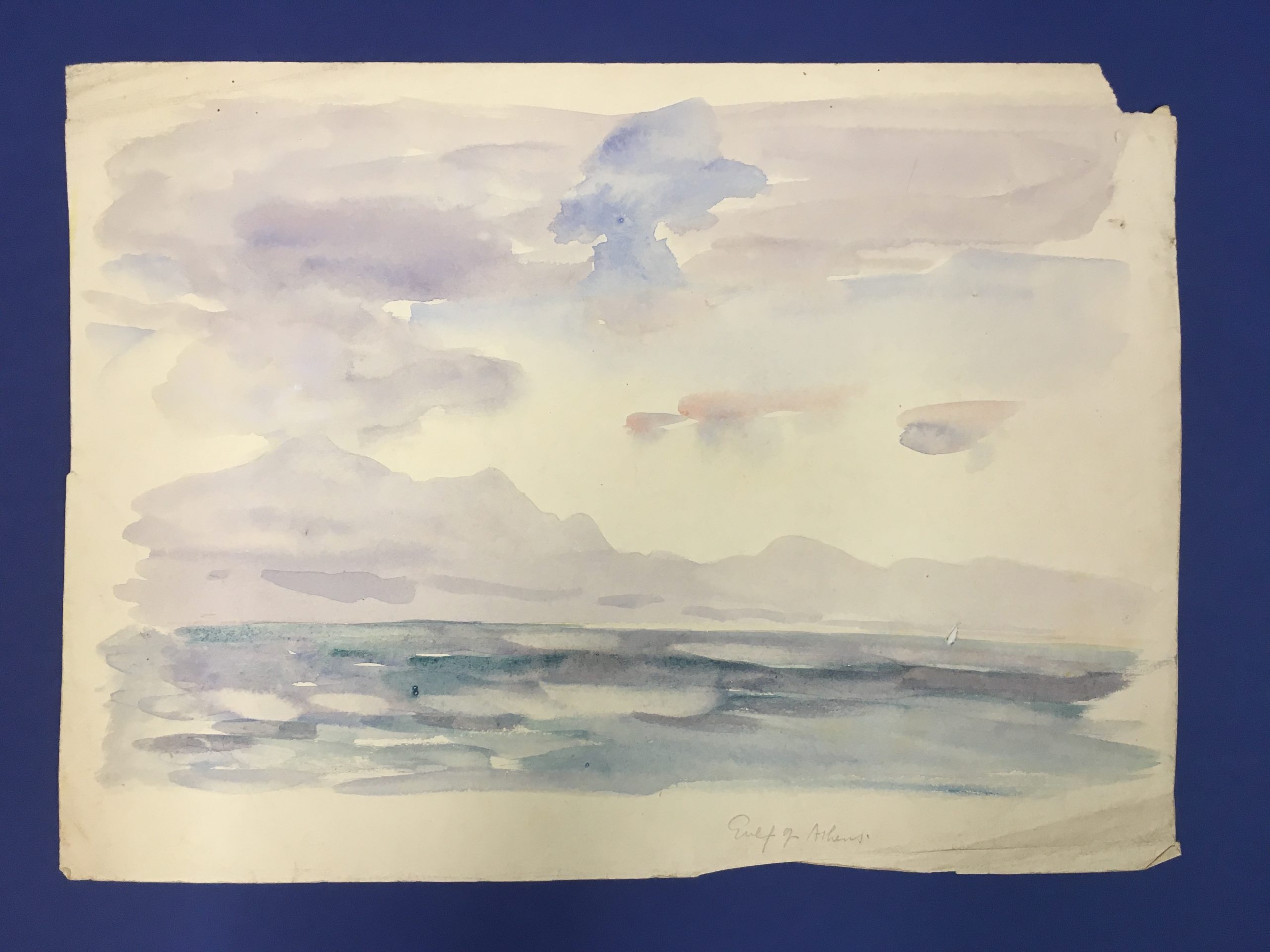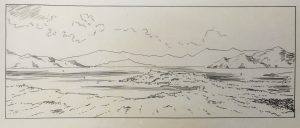Long years a slave, I grind the corn,
Or at the door I stand and bend
To all who come and go.
Euripides, Trojan Women 490-494
Thalia, returning with her mother from the market, arrived at the inn just as Leon appeared. For once she was not chattering and Leon, glancing at her, noted that her eyes were swollen. She had been crying.
“What’s wrong?” Leon asked his hostess.
“Oh!” Phylinna replied, “she has upset herself, for she wandered away while I was busy bargaining and found herself among the slaves for sale.”
“The poor old woman”, Thalia suddenly burst out. “Her hands were tied and she couldn’t drive off the flies teasing her. I flicked them away until mother came up. The poor woman kept saying something about her young mistress.”
Something woke in Leon on Thalia’s mention of an old slave woman and her mistress. He asked her “Was the old woman wearing a rust-coloured mantle, and unusually shaped silver earrings?”
“Yes,” replied the child, “how did you know?”
Leon walked quickly down the street, fearing the worst. He crossed the Agora, at the far end of which was the slave market. It was almost deserted: the slaves had been sold or taken away. But then he spotted a woman in a brown cloak bowed on the stone bench. Leon slowly approached and uttered her name. Doula looked up suddenly, then glanced around nervously and whispered, “My mistress! Save her!”
“Where is Eugenia?” demanded Leon.
“I don’t know for certain, but can guess. She is now a slave like me. We were captured as we journeyed from Patras to Athens. We had dismounted at a lonely spot, when a group of robbers appeared and seized the horses and all our baggage. Shortly after a trader appeared and offered to buy us. The bargain was soon struck and we were left with our new master, a cruel man. He listened to my mistress, and promised to restore her freedom. He promised to take us to the Piraeus, which pleased us as my mistress’ father was due to land there shortly. Then the trader took us to a lonely house and locked us in a room with a grated window. He fed us well, but threatened us with death if we tried to escape or call attention to our plight.”
“Last night, hearing voices outside the room, I listened with my ear to the keyhole. The trader was bargaining with a master sailor for a passage to Ephesus. He said his new purchase was young and beautiful and he would get a better price for her at an Eastern court than in Athens, where her tale might be given attention. He said that I would be sent to the market for what I would fetch. What could we do!”
“Early this morning I was torn from my mistress’ arms and forced to trudge to Athens. Now hurry, if you are to save my mistress! Already, she may be on her way to the vessel.”
A man’s voice from behind caused Leon to turn. It was the overseer of the slave market. “Are you seeking a slave my master, who can clean and cook?” he asked. “This one is old but reliable. Her master has priced her at two minas.”
At any other time, Leon would have bargained, but time was pressing. He looked round. The banker Nikomenes was still sitting at the table in his little booth. Leon had been to him on several occasions, always returning with his purse well filled. He ran across. Could he have two hundred drachmas?
Nikomenes looked at him shrewdly. “My young friend,” he said, “we agreed last time that you were coming to an end of your father’s credit. He has not sent me any further payment. May I remind you that you will need to pay for your passage home, not to speak of your intention of entering at Olympia.”
“I need it urgently for a friend,” replied Leon. “Time presses, but thank you for your concern.” Nikomenes shook his head and counted out the drachmas. Leon picked up the money and hastening back, handed it to the overseer. Doula was freed and, without looking back, Leon led the way to the inn.
When they arrived, Thalia was sitting within the doorway, pensive. She looked up and her eyes widened.
“I thought you wanted her bought by someone who would be kind to her,” said Leon. “But I must see your mother at once.”
Inside, meanwhile, Leon turned to Doula: would she know the house where her mistress was held. “No,” answered the slave, “my eyes were bound and it was before dawn. My poor mistress!” Just then the hostess appeared with a surprised air and Leon explained that Doula was a much trusted servant of his friend. He requested that she would be well lodged in order to recover from harsh treatment she had received.
“Can you tell me where I may find a swift horse?” Leon asked. Phylinna feared this was impossible, for every horse of any speed was away at the stadium, being practiced for the chariot races. Leon lacked the time or money to go looking for one there. He told his hostess not to worry if he returned late that night, nodded to Doula, waved to Thalia and was gone.
Leon had made up his mind how to get to the Piraeus. He had kept up his running and his friend and mentor Sokrates was well satisfied with his progress. After all, the distance was not great; he would be at the port in half an hour or so if he kept up the pace. He passed through the Piraeus Gate and, a little way beyond, put forth his best speed.
When he was half way, the sound of hoofs made him turn. A two-horse chariot was gaining on him, a youth in the light vehicle swaying with its movement, half hidden in the dust. Leon tried to keep up with the chariot and the young man looked at him with interest, eased the pace of his steeds and called: “Friend, are you training for the races? If so, this is a dusty course.” Leon gasped that he had to be at the Piraeus as soon as possibly in hopes of catching a vessel before she put out of the harbour.
“Come with me,” invited the youth. “I too am bound for the port. Good runner as you are, you will not be able to sustain that pace for long.” Leon jumped in while the chariot was still in motion and his new friend cheered on his beasts. Leon sat still for a few moments watching the horses’ backs. Then, his companion asked why he was in such a hurry and Leon began to blurt out in hurried sentences the real purpose of his journey.
“Well, you have lit on the one best able to help you,” responded the youth as he puffed out his chest. “I am Archippos son of Nikomachos, the harbourmaster, and will take you to him. He knows the incoming and outgoing of every vessel and not a ship dares leave without his nod. We must reach the port as soon as possible.” And with that Archippos did all he could to expedite the journey. He raced the chariot noisily through the Piraeus streets, folk scattering to right and left. He checked suddenly as they came to the quay. Before them lay the spacious harbour, surrounded by warehouses and lined with vessels of all descriptions. Archippos called to a passing slave, “Agias, hold these animals for me. Have you seen my father?”
“Only a few moments ago, Archippos. I saw him at the harbour’s mouth, dispatching a vessel to Ephesus.”
“Come,” shouted Archippos to Leon, and the pair tore along the busy quay, jumping bales and sacks and dodging porters.
“There he is,” exclaimed Archippos, “I will introduce you.” A sturdy man, wrapped in a dark blue cloak was approaching. Archippos knelt briefly before his father then said, “This is Leon of Massalia, whom I met on the road from Athens. He wishes most urgently to detain a vessel leaving for Ephesus.”
“One left the harbour to cross the Eastern Sea only half an hour ago,” answered Nikomachos. “A slave girl gave us a great deal of trouble before she was safely on board.” Leon uttered an exclamation, at which Nikomachos looked thoughtful. “Did you say your name was Leon? This poor girl, besides calling on all the gods, begged all around to tell her where ‘Leon of Massalia’ was lodging and offered riches to anyone who would fetch him from the city. She was a fine girl and spoke good Greek. She declared she was no slave but had been kidnapped and sold to the trader. I had to let him take her at last: he showed me his papers all correctly made out. But her shrieks as they carried her aboard are still ringing in my ears.”
“Ah! father,” exclaimed Archippos, indicating Leon. “I have brought him here too late to stop the vessel. Eugenia is no slave, but a lady of Syracuse wrongfully taken.”
“Eugenia! Yes that’s her name!” cried Nikomachos. “Well the ship is only an old cargo vessel under sail and cannot have got far. I will offer sacrifice to Poseidon when the girl is rescued.” He turned and immediately began roaring orders that caused a buzz of activity. Men ran to and fro, and soon a line of strong fellows stood on the quay edge, ready to board a long galley with a great bronze capped beak. The rowers jumped in; a few armed guards as well. “Will you go too, lad?” invited the harbourmaster. Leon turned to Archippos, speaking earnestly with him for a moment. Archippos then ran off to where his chariot was waiting, while Leon jumped aboard.
“Good luck,” shouted the harbourmaster. He called to the captain of the galley, who stood waiting, “Go!” The vessel pushed off and shot forward under the thrust of many oars.
To read chapter twenty-six click on this picture



